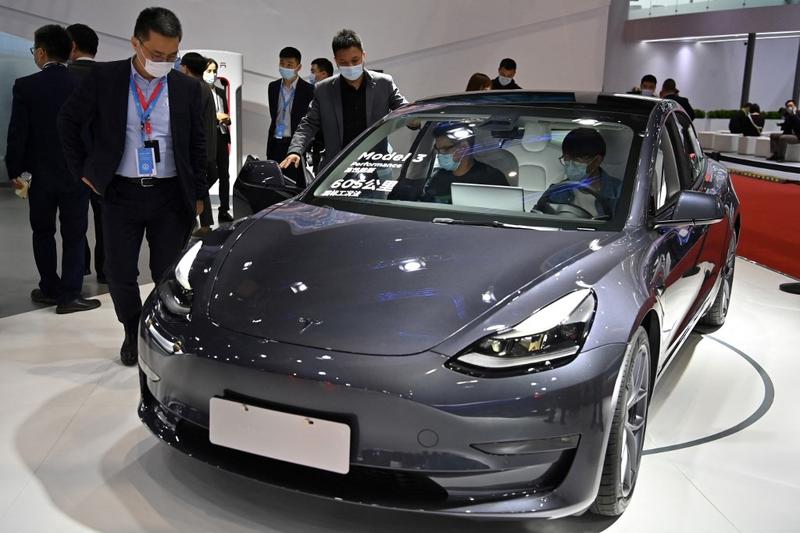Transition to electric vehicles will not be easy amid lack of domestic production, support infrastructure
 In this file photo taken on April 19, 2021, a Tesla model 3 is seen during the 19th Shanghai International Automobile Industry Exhibition in Shanghai. (HECTOR RETAMAL / AFP)
In this file photo taken on April 19, 2021, a Tesla model 3 is seen during the 19th Shanghai International Automobile Industry Exhibition in Shanghai. (HECTOR RETAMAL / AFP)
India faces a daunting task in achieving its goals for a shift to electric vehicles given the absence of adequate domestic manufacturing facilities and the lack of support infrastructure such as batteries and charging stations, experts said.
While the government plans to have EVs make up 30 percent of all new vehicles sold in India by 2030, realizing that ambition looks anything but easy, as of now.
Ensuring the raw materials for batteries used in EVs is one of the major challenges faced by India in efforts to step up domestic output of the crucial component.
Experts noted that China controls the major chunk of key raw materials needed for making the batteries used in the clean energy vehicles, while India’s domestic electric battery manufacturing base is in a nascent stage.
“Unlike China, India doesn’t have any large-scale electric vehicle or battery facilities … Nor does it have much ownership of the raw natural resources —cobalt and lithium in particular — that are considered crucial inputs in the production of batteries,” said Prabir Kumar Bose, former director of the School of Automotive Engineering at Jadavpur University in the state of West Bengal.
Experts noted that China controls the major chunk of key raw materials needed for making the batteries used in the clean energy vehicles, while India’s domestic electric battery manufacturing base is in a nascent stage
The Indian government has mapped out a range of incentives for EV producers as it seeks to gradually phase out conventional combustion engine cars in a bid cut to emissions and address climate change.
Under a plan that envisages the nation moving to 30 percent EVs by 2030, the ministry of road transport and highways last week announced exemption of registration fee for electric vehicles.
Earlier, the federal government, in its budget, allocated US$96.8 million to promote hybrid and EVs in India under a program called “Faster Adoption and Manufacturing of Hybrid and Electric vehicles in India”, or FAME-India.
READ MORE: At pole position, China vrooms EVs for global lead
Under the scheme, India will set up 2,877 EV charging stations in 68 cities spread over 25 states by 2024. And more measures are likely to be announced by the government to boost the production of EVs.
Speaking at a forum on Aug 10, India’s Minister of Road Transport and Highways Nitin Gadkari said that by 2050, there will be more electric vehicles than conventional ones in India.
Outlining the vision, Gadkari said batteries were the most important component of EVs and constituted at least 50 percent of the upfront cost. This is an area where his ministry is encouraging innovation, he said.
China has three times’ the battery plant capacity of even the US, while India has scarcely any, according to Bloomberg New Energy Finance.
Elon Musk, chief executive of US electric-car maker Tesla, tweeted last month that building an EV factory in India is only plausible if the imported Tesla cars receive a good response in the Indian market.
“If Tesla is able to succeed with imported vehicles, then a factory in India is quite likely," Musk said.
Against the backdrop of Musk’s comments, India is reported to be looking at slashing import duties on electric cars to as low as 40 percent.
Indian auto makers say the existing measures to encourage EVs are inadequate.
The EV targets could be met to some extent, but only if the government spends billions of dollars to build out a nationwide network of charging stations and provide tax incentives to consumers, among other measures, they said.
Alok Ray, assistant director of the Society of Manufacturers of Electric Vehicles, or SMEV, an association representing Indian EV and component makers, suggested that India, like China, should announce some cities where only EVs would be allowed to ply after establishing the necessary infrastructure.
ALSO READ: Seat of learning: EVs to feature popular apps
“Indians want to shift as the price of petrol is … spiraling out of control everyday,” Ray said.
China has the largest number of electric cars on its roads with a total of 4.5 million, according to the International Energy Agency’s Global EV Outlook. India’s cumulative EV sales stood at 238,120 units during the 2020-21 fiscal, according to SMEV.
India’s transport sector is a voracious consumer of the world’s crude oil. According to official data, the country imported 198.1 million tons of crude worth US$62.7 billion in the fiscal year ended March 2021.
Using alternate energy sources like natural gas and shifting to EVs is a key way to reduce dependence on imported crude, and it will also protect the country from energy price shocks at the global level, experts suggested.
Some automobile manufacturers and power utilities have thrown their support behind EVs. Tata Motors and Mahindra Group, two big vehicle makers, and Tata Power have pledged to build 300 rapid charging stations in five major cities around India by the end of this financial year.
Meanwhile, traditional auto makers as well as some industry observers warn that if the government seeks a rapid shift to EVs, it will cause huge damage to the thriving supply chain built around the internal combustion engine. Labor unions are fearful of job losses if the transition moves too quickly.
“An abrupt and sudden changeover will disrupt the entire system, including vendors, dealers, spare parts manufacturers, mechanics, as well as other stakeholders, thereby impacting the livelihoods of millions of people dependent on the industry,” said Amit K. Biswas, a professor at Visva-Bharati University in Santiniketan, West Bengal.


